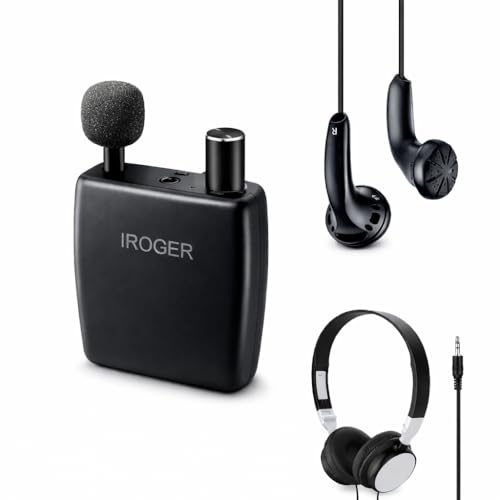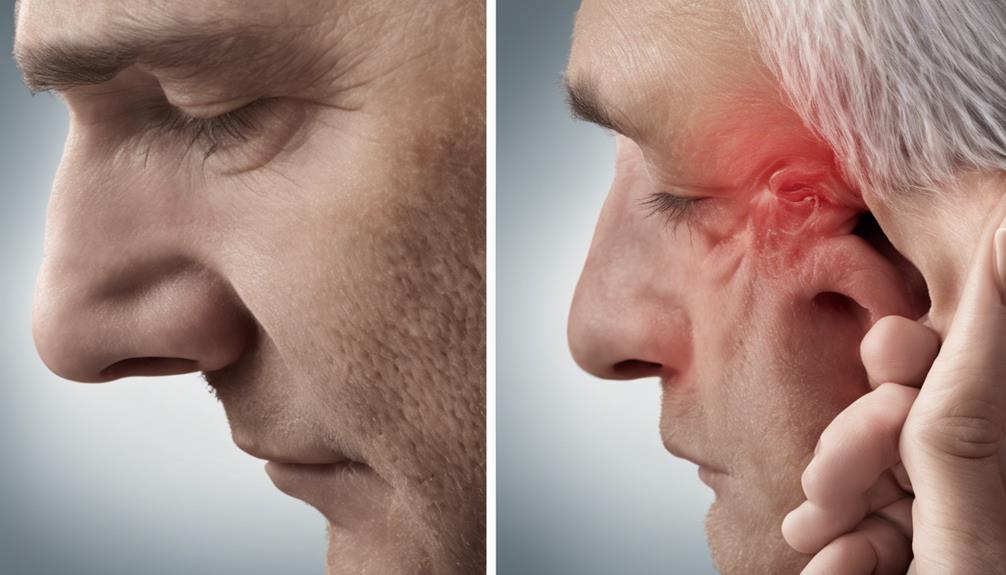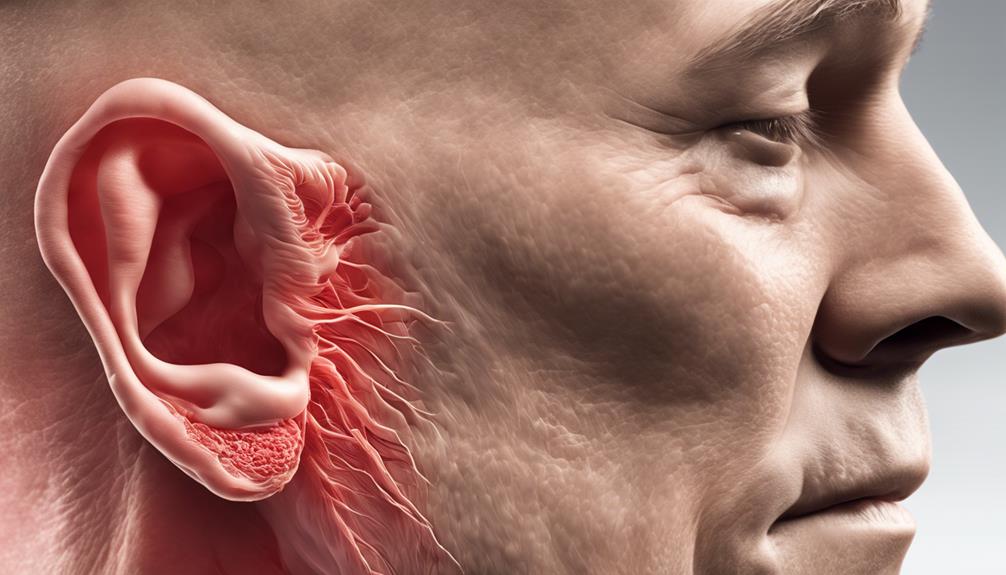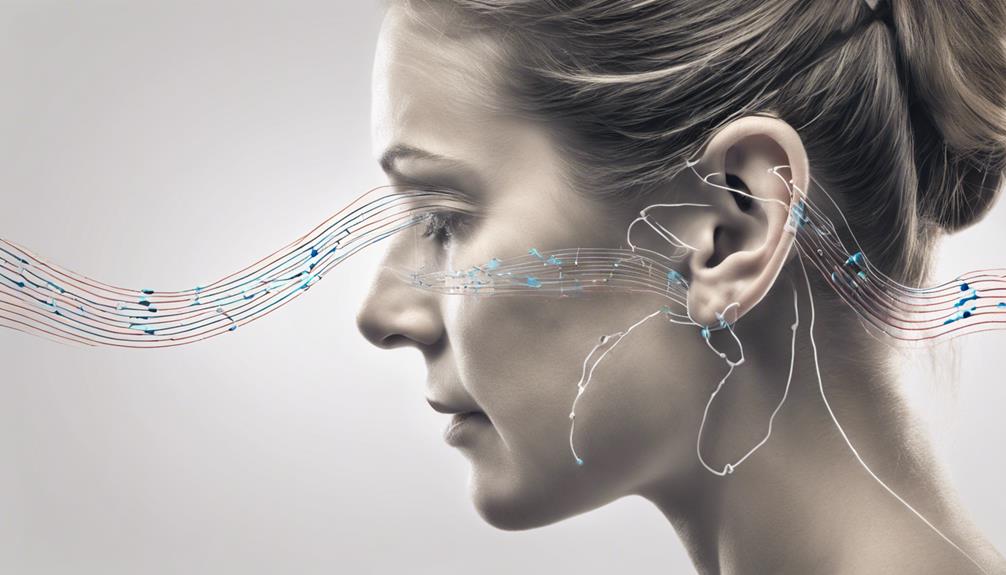Have you ever thought about how a common sinus infection could subtly impact your hearing? Be prepared for an unexpected link between sinusitis and hearing loss that could raise more questions than answers.
As we explore the intricate relationship between sinus infections and your ability to hear, you'll uncover the hidden mechanisms at play and the potential impact on your auditory health.
Stay tuned for insights on how to navigate this lesser-known link and safeguard your precious sense of sound.
Key Takeaways
- Sinusitis can lead to temporary or permanent hearing loss through Eustachian tube dysfunction.
- Swelling from sinus infections can create pressure imbalances impacting ear health.
- Untreated chronic sinusitis may result in irreversible hearing damage.
- Prompt treatment of sinus infections is crucial to prevent potential hearing issues.

IROGER Hearing Amplifier for Seniors, Personal Sound Amplifier, Smart Auto-Gain, Directional Microphone, Rechargeable with 120-Hour Battery, Headphones & Earbuds Included
Smart Auto-Gain Control – Enjoy crystal-clear sound at all times. iRoger automatically balances audio levels to enhance voices...
As an affiliate, we earn on qualifying purchases.
Understanding Sinus Infections and Hearing Loss
Understanding the connection between sinus infections and hearing loss is crucial for recognizing the potential impact on one's auditory health. Sinusitis, an inflammation of the sinuses, can lead to temporary or even permanent hearing loss. The Eustachian tube, a small passageway that connects the middle ear to the back of the nose and throat, plays a vital role in maintaining equal air pressure on both sides of the eardrum. When the Eustachian tube becomes swollen due to sinusitis, it can cause pressure imbalances, resulting in hearing issues.
Furthermore, sinus infections can lead to fluid buildup in the ear, further impacting hearing. This fluid can disrupt the normal functioning of the ear, leading to decreased hearing abilities. While sinus-related hearing loss is often temporary in acute cases, chronic sinusitis left untreated may result in permanent damage to one's hearing. Recognizing the signs of sinusitis and seeking timely treatment is essential in preventing potential long-term hearing complications.

Joanbro Personal Sound Amplifier for Seniors, Voice Enhancement Devices, Pocket Sound Amplifiers for Elderly People, Adults, 50dB Gain, with Headphones & Earbud, 3 Types Mics, 3 Tone, Volume Control
SUPERIOR PERSONAL SOUND AMPLIFIER: Applying noise cancelling, automatic gain control and advanced amplifying circuit, this sound amplifier device...
As an affiliate, we earn on qualifying purchases.
Symptoms of Sinusitis and Hearing Issues

Symptoms commonly associated with sinusitis include ear pressure, earache, and jaw discomfort, all stemming from inflammation affecting the Eustachian tube. Sinus infections can lead to issues in the ear, such as ear pain, temporary hearing loss, tinnitus, and a sensation of fullness in the ear.
Studies have shown a significant correlation between sinusitis severity and sensorineural hearing loss, suggesting a potential link between chronic rhinosinusitis (CRS) and cochlear function impairment. In fact, 75% of CRS patients with hearing loss experienced high-frequency range hearing loss. Furthermore, research has indicated that individuals with CRS have lower DPOAE pass rates compared to control groups, indicating possible damage to cochlear function.
This damage may be linked to complications such as otitis media and middle ear infections. Understanding these symptoms and their implications is crucial in comprehending the impact sinus infections can have on hearing health.

IROGER Hearing Amplifier Rechargeable Hearing Device with Standard Headphone Personal Sound Amplifier PSAP for Ears,Seniors,Directional Microphone
Auto Gain Control for Clearer Sound-- Automatically adjusts volume levels to deliver balanced, high-quality sound amplification. Ideal for...
As an affiliate, we earn on qualifying purchases.
Impact of Sinus Infections on Hearing
How do sinus infections impact hearing health, and what're the potential consequences of untreated chronic sinusitis on cochlear function?
Sinus infections can have a significant impact on hearing, especially when it comes to issues related to the Eustachian tube and middle ear. When the Eustachian tube becomes blocked due to sinusitis, it can lead to fluid accumulation in the middle ear, causing ear pain and temporary hearing loss.
Chronic sinusitis, if not properly addressed, can result in permanent hearing loss by affecting the cochlear function. The inflammation and swelling in the sinuses can disrupt the Eustachian tube's functionality, hindering sound transmission and potentially leading to long-term hearing impairment.
It's essential to address sinus infections promptly to prevent potential hearing loss and maintain overall ear health. Being proactive in treating sinusitis can help avoid complications that could impact one's hearing abilities in the long run.

Neosonic Rechargeable Hearing Amplifier to Aid TV Watching and Conversation, Wireless Neckband Headphones for Seniors & Adults, Remote Microphone Noise Cancelling - NW10 Pro
BACKGROUND NOISE REDUCTION - Equipped with a wireless external microphone, the NW10 Pro allows you to place the...
As an affiliate, we earn on qualifying purchases.
Preventing Hearing Loss From Sinus Infections

Prompt treatment of sinus infections plays a crucial role in preventing temporary or permanent hearing loss. Sinus infections can lead to complications such as middle ear infections, known as otitis media, due to the connection between the sinuses and the middle ear through the Eustachian tube.
When sinusitis causes nasal congestion, it can block the Eustachian tube, leading to fluid buildup in the middle ear. This fluid can result in symptoms like ear pain and even hearing loss if left untreated. Managing sinus infections promptly with medications, decongestants, and saline spray can help reduce the risk of hearing impairment by preventing fluid accumulation in the ears.
In cases of chronic sinusitis where traditional treatments may not be effective, balloon sinuplasty can be considered to alleviate pressure on the ears and prevent potential hearing loss. Proper care and treatment of sinus infections are essential for preserving ear health and preventing associated hearing issues.
Treatment Options for Sinus-Related Hearing Loss
Addressing the underlying sinus infection with appropriate medication is crucial in managing sinus-related hearing loss. Antibiotics or antifungal medications may be prescribed to target the infection directly, aiding in the resolution of symptoms that affect hearing.
In addition to medication, various treatment options can help alleviate sinus-related hearing issues:
- Decongestants and Nasal Steroid Sprays: These can reduce inflammation in the sinuses, alleviating pressure on the Eustachian tube and potentially improving hearing.
- Balloon Sinuplasty: A minimally invasive procedure that can be considered for chronic sinusitis to restore sinus drainage, thus relieving ear-related symptoms.
- Antihistamines: Prescribed to manage allergies that may contribute to sinusitis, aiding in controlling associated hearing loss.
- Mucolytics: These help in thinning mucus within the sinuses, facilitating better drainage and relieving ear pressure, which might enhance hearing in sinus-related cases.
Frequently Asked Questions
How Does Sinus Infection Cause Hearing Loss?
Sinus infections can cause hearing loss through fluid buildup in the middle ear and swollen Eustachian tubes disrupting sound transmission. If untreated, prolonged sinusitis can lead to permanent hearing loss.
Pressure changes from sinusitis affect middle ear function, impacting hearing. Understanding this connection is crucial for prompt treatment and prevention of long-term complications.
How Long Does It Take to Fully Recover From Sinusitis?
Recovery from sinusitis can vary significantly depending on the type and severity of the infection. Acute cases typically resolve within 1-2 weeks, while chronic sinusitis may require several weeks to months for full recovery.
Factors like treatment adherence, underlying health conditions, and immune system strength play crucial roles in the recovery timeline.
Seeking proper diagnosis and treatment recommendations from a healthcare provider can expedite the recovery process and ensure a faster return to health.
How Can I Get My Hearing Back From Sinuses?
To regain hearing due to sinus issues, prompt treatment is key. Medications like decongestants, saline sprays, and antihistamines can help reduce sinus pressure and improve hearing.
In some cases, minimally invasive procedures like balloon sinuplasty may be necessary for chronic sinusitis. It's crucial to address sinus problems promptly to prevent long-term hearing loss.
Effective management of sinus infections can prevent complications and enhance overall ear health.
How Do You Relieve Sinus Pressure in Your Ears?
When we're looking to relieve sinus pressure in our ears, there are several effective strategies we can employ.
Steam inhalation with essential oils like eucalyptus or peppermint can help clear nasal congestion, while nasal irrigation using a saline solution can flush out mucus.
Applying warm compresses to the affected ear area and using over-the-counter decongestants or nasal sprays may also alleviate discomfort.
Staying hydrated and maintaining good sinus health can prevent further congestion and ear pressure.
Conclusion
In the symphony of sinus infections and hearing loss, it's crucial to tune into the harmony of prevention and treatment. Like a skilled conductor guiding an orchestra, proper care and attention can ensure that the delicate balance of the ears and sinuses remains intact.
With the right notes of medication, decongestants, and saline sprays, we can keep the melody of our hearing health playing strong and clear, avoiding the discord of long-term impairment.










